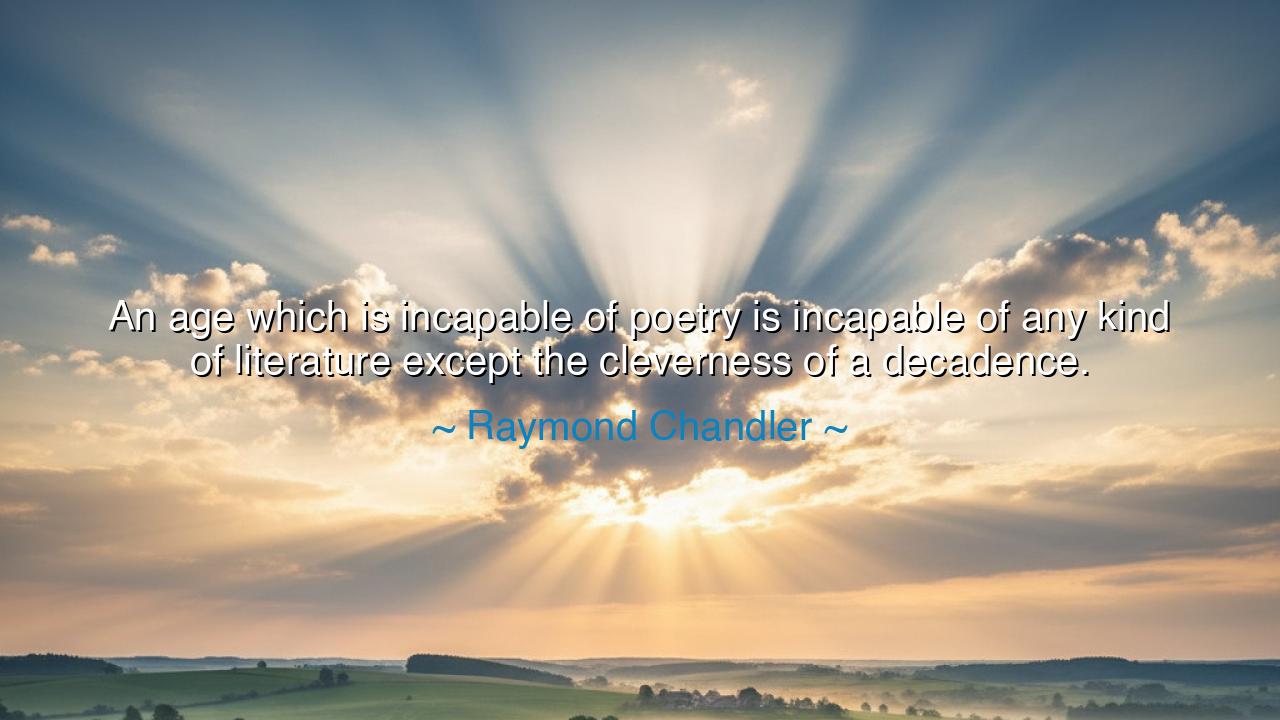
An age which is incapable of poetry is incapable of any kind of
An age which is incapable of poetry is incapable of any kind of literature except the cleverness of a decadence.






In a time when the light of truth flickers and fades, Raymond Chandler spoke words that resound like a warning bell across the centuries: “An age which is incapable of poetry is incapable of any kind of literature except the cleverness of a decadence.” In this declaration, he names the sickness of a civilization that has forgotten how to feel, how to dream, how to speak from the soul. Poetry—the breath of wonder, the pulse of human truth—when it dies, drags all other arts down with it. For when the heart grows cold, the mind becomes only clever, and cleverness is but the ghost of wisdom.
To be incapable of poetry is not merely to lack verse or rhyme. It is to lose the ability to see beauty in suffering, to find meaning in mystery, to sing even amid despair. Poetry is not an art among others; it is the root of all creation. It is the fire that gives life to story, philosophy, and song. Without it, words become ornaments for empty rooms, clever arrangements of sound without soul. Chandler, who lived in the hard-boiled world of detective fiction, understood that even the sharpest logic, the most cunning prose, dies without the heartbeat of poetry behind it. The detective’s gaze may cut through deceit, but the poet’s gaze sees through existence itself.
So it has been since the dawn of time. When the ancient Greeks spoke through Homer, their epics were not mere stories of war and heroes—they were the mirror of their civilization’s soul. The Odyssey and the Iliad were poems not only of men but of meaning, of gods and destiny, of courage and folly intertwined. When Athens fell into decay, when rhetoric replaced revelation and flattery replaced faith, the poets grew silent, and philosophy became mere debate. Thus, as Chandler warns, when an age can no longer give birth to poetry, it has entered the cleverness of decadence—a brilliance without warmth, an intelligence that no longer knows love.
Consider the fall of Rome, that empire of marble and might. In its infancy, Virgil sang the Aeneid, a vision of divine purpose and national destiny. But in its twilight, Rome’s poets wrote for spectacle and laughter, for fleeting applause from hollow hearts. The people still read, still spoke, still created—but they no longer believed. They adorned decay with wit, and called it art. Such is the fate of all civilizations that lose their poets: they may glitter for a moment, but they have already begun to rot from within.
Chandler’s words, then, are not nostalgia—they are a summons. He reminds us that poetry is the lifeblood of meaning, the guardian of the sacred. In every age, there must be those who speak with the voice of the soul, who name the unseen, who keep the fire alive when reason alone cannot. Without poetry, even progress becomes vanity; knowledge becomes noise; art becomes artifice. To create without poetry is to build temples to emptiness.
From this truth springs a lesson for us all: nurture the poetic spirit within you. Do not let the machinery of modern life drown out your capacity for wonder. When you see a sunrise, pause; when you feel grief, let it teach you; when you love, let your words rise like prayer. For poetry does not demand that you write—it demands that you feel deeply and live truthfully. Every act of compassion, every moment of awe, every silence that trembles with meaning is a form of poetry.
Beware, therefore, of becoming a creature of cleverness alone. For cleverness without heart builds only decay. Let your words, your work, your life be more than invention—let them be song. Seek not the applause of the crowd but the still voice of eternity within you. To live poetically is to live awake—to see that even in the ashes of the world, beauty still breathes.
Thus, the teaching endures: when the age forgets its poets, you must become one. Keep alive the sacred flame of poetry, for it alone redeems cleverness, restores meaning, and binds the scattered fragments of the human spirit back into wholeness.






AAdministratorAdministrator
Welcome, honored guests. Please leave a comment, we will respond soon